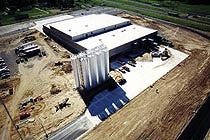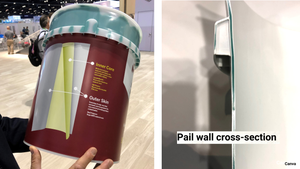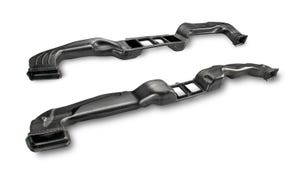WEB EXCLUSIVE:Industry Watch
September 1, 2001
Textron steers away from automotive marketÂ
AS ONE AUTOMOTIVE parts supplier looks to distance itself from the tumultuous waters of the automotive industry, another is seizing upon the opportu-nity to dive headfirst into the choppy market. Pending U.S. and European regulatory approval, Collins & Aikman Corp. (Troy, MI) will purchase the Automotive Trim Div. of Textron Automotive for $1 billion cash and 18 million shares of Collins stock.Â
In an effort to shift its portfolio, Textron Inc. will see its revenue from automotive sales shrink from 31 percent to 18 percent once the Trim Div. is divested. Collins, however, has greatly increased its dependency on the automotive market by adding interior and exterior trim, including bumpers, spoilers, and cockpits, to its own line of automotive floor and fabric products and acoustic systems.Â
Textron Trim's $1.9 billion in sales last year represented 63 percent of Textron Automotive's overall earnings, and made the division's molding operation the largest in terms of revenue in the U.S. The divestiture of the company's 38 molding facilities and 13,000 employees worldwide will leave Textron devoid of any molding.Â
Collins, owned by Heartland Industrial Partners LP (Greenwich, CT), will take on all of those molding op-erations and a client list that includes DaimlerChrysler, GM, and Ford domestically, as well as Volkswagen and Audi abroad.Â
Retail U.S. car and light truck sales, units | 2001 | 2000 | % Change | 2001 | 2000 |
General Motors | 358,928 | 394,930 | -9.1 | 2.81 | 3.01 |
Ford | 302,279 | 346,230 | -12.7 | 2.33 | 2.62 |
DaimlerChrysler | 201,753 | 206,757 | -2.4 | 1.51 | 1.65 |
Toyota | 143,283 | 135,457 | +5.8 | 1.00 | .948 |
Honda | 100,921 | 107,486 | -6.1 | .704 | .683 |
Nissan | 56,725 | 69,029 | -17.8 | .408 | .446 |
Volkswagen | 39,985 | 36,686 | +9.0 | .256 | .256 |
Mazda | 24,071 | 24,418 | -1.4 | .164 | .149 |
Mitsubishi | 22,822 | 30,005 | -23.9 | .178 | .186 |
Subaru | 16,105 | 15,104 | +7.1 | .105 | .098 |
BMW | 19,046 | 15,168 | +25.6 | .126 | .103 |
Total Cars | 667,550 | 744,131 | -10.3 | 5.06 | 5.41 |
Domestic Cars | 493,079 | 567,767 | -13.2 | 3.86 | 4.23 |
Import Cars | 174,471 | 176,364 | -1.1 | 1.20 | 1.18 |
Total Trucks | 684,143 | 692,591 | -1.2 | 4.99 | 5.14 |
Domestic Trucks | 604,172 | 620,449 | -2.6 | 4.46 | 4.66 |
Import Trucks | 79,971 | 72,142 | +10.9 | .537 | .486 |
Total Vehicles (million) | 1.35 | 1.43 | -5.9 | 10.06 | 10.56 |
Source: Autodata Corp., Woodcliff Lake, NJ | |||||
This table reflects the lagging sales experienced over the course of the past year by many automakers. This downturn followed record revenues in late 1999 and early 2000 and is symptomatic of the market instability Textron is trying to minimize. |
New electric machines get a low-key introÂ
FOUR EUROPEAN COMPANIES—Engel, Krauss-Maffei, Mir, and Netstal—have announced plans to roll out new electric molding machines at K 2001. Netstal is showing only a prototype of a general molding machine but is launching an electric molding subsystem for optical disks. Engel, which previously showed development machines, now has a line for sale—tiebarless, naturally. IMM attended recent press conferences previewing these machines, and was struck by the controlled enthusiasm displayed. To be fair, there is great enthusiasm for the technology, much of which is discussed in our K 2001 preview. Enthusiasm softens, however, when talk shifts to the markets for electric machines. Unlike most of the current electric machine suppliers, these four believe that electric technology will not take over the market. Electrics have advantages for molding high-precision small to medium parts, they say, mostly on machines in the 50- to 200-ton range. They estimate electrics will gain a maximum of 25 to 30 percent of the overall worldwide machine market in the short to medium term.Â
Citing continuing advances in hydraulic and hybrid technology, the companies believe performance is being increased and energy consumption reduced, nearly to the level of electrics, without the 10 to 30 percent cost markup. Only those with very high precision demands can justify the cost of an electric, they contend.
Tiny parts offer big business hopes for new micromolding facilityÂ
AS PAUL FINK SURVEYS the future of micromolding, he's overwhelmed with the kind of anxious trepidation that always accompanies the unknown. "It's kind of exciting," Fink explains. "I can't tell you what the future is going to bring other than that we're going to be a player in the micro market, and if the niche continues to grow at the rate it is now, we'll all be tremendously successful."Â
Fink is the president of Micro Precision Products, a new micromolding facility in Rancho Santa Margarita, CA that began operations in August. For the last 15 years, Micro has served as a toolshop and low-volume prototype supplier for clients primarily within the medical and electronics fields, but a burgeoning demand for micro products prompted the company to add molding.Â
"We contacted a couple of people that we had been doing business with for a number of years in the medical field," Fink says, "and let them know that we were putting in a new facility just for the molding of microsized components. The response, even in the downturning economy, has been amazing."Â
To meet that response the 7000-sq-ft plant will employ 14 all-electric presses from Nissei ranging from 3 to 20 tons. A toolroom featuring CNC wire and sinker EDMs and CNC milling machines will occupy 3000 sq ft of the plant. Throw in a climate-controlled whiteroom environment as well as robots for parts removal that use drop chutes for weight inspection and the new facility solidifies the company's stature as a full-service micromolder.Â
In light of a stagnant economy and California's energy problems, the current price tag of $1 million seems risky, but Fink insists that the economics of micromolding are as unique as the miniature parts it creates.Â
"[Micromolding] is somewhat isolated and somewhat sheltered from the traditional economy," he explains, "because the entire field of micro devices is really just now starting to take off and grow."Â
And even in the face of possible energy woes, Fink feels the company is where it needs to be to compete. "We positioned ourselves to be at the center point of that technology," he says.
 Asahi invests to speed delivery
Asahi invests to speed delivery
ASAHI KASEI, AN $11 billion Japanese chemical concern, recently made a major investment in new compounding facilities for its Asahi Thermofil and Asahi Kasei Plastics businesses. The Fowlerville, MI plant is billed as the most technically advanced compounding facility in the world. A recent tour of the $35 million plant revealed six new ZSK continuous extruders equipped with au-tomated weight loss feeding systems for stable and reliable production.Â
Unveiled in July and dubbed Fowlerville Center, the 100,000-sq-ft plant's capacity is rated at more than 200 million lb per year. It also houses corporate headquarters and contains CAE and analytical labs. A majority of the material produced there will be Thermylene PP from Asahi Thermofil, with some nylon, PPE, and acetal production for Asahi Kasei Plastics.Â
Why did Asahi Kasei, a Forbes 200 company formerly named Asahi Chemical Industry, decide to build a new compounding plant? Kazumoto Yamamoto, president, says, "We believe a supply of locally manufactured products is indispensable in meeting customer demand. We do not believe that centralized production can support our customers' global needs." In this case, the customers being served by the plant are nearby automotive suppliers.Â
When asked how quickly this plant will be able to fulfill orders, David Donie, vp operations and technology, says, "For some of our polypropylene products, we can have a truck filled and ready to go in 4 hours."
Nypro builds new plants in France and HungaryÂ
AS MANUFACTURERS downsize and head overseas, molders are following, hoping to take advantage of the shifting opportunities and to maintain existing business.Â
Such is the case with Nypro Inc. (Clinton, MA), which recently announced two expansions into the European market. The first is a medical molding operation in Chartres, France, and the second is a joint venture in Tata, Hungary to serve the European telecommunications industry.Â
"The market in Europe is relatively strong for our customer base," Nypro Spokesman Al Cotton explains. "We basically go where our customers are, and there's been quite a bit of growth and expansion by our global customers in Europe. So that's what fuels our growth."Â
The French facility is a 32,000-sq-ft Class 100,000 cleanroom operation that runs 16 machines and employs 50 people. The facility was purchased by Nypro from the Mayet Pierre de Bresse Group for an undisclosed sum.Â
Nypro's second European expansion is a joint venture with Hungarian manufacturing company Karsai Holding Plc. The 32,000-sq-ft plant will launch with 20 machines and 60 employees and opens this month. Nypro has invested approximately $5 million in the facility, which it will operate with its partner as Nypro-Karsai Ltd.Â
The expansion into the former Eastern Bloc country was initiated to a degree by a proactive Hungarian government very interested in U.S. investment.Â
"They [the Hungarian government] are doing everything," Cotton says. "They are going all out for global business."Â
"Everything" for the eastern European country runs the gamut from renting booths at trade shows to offering tax breaks, according to Cotton, but perks from the government aren't the only reason to expand to Hungary. Cotton cites a strong economy, a stable political system, and an extensive manufacturing infrastructure as other assets the country offers.Â
Nypro's new business comes at a time when earnings losses, layoffs, and closures clutter the headlines, but Cotton says Nypro looks at the grim news from the perspective of a global player with operations in 12 countries.Â
"When we look in the paper," Cotton says, "what we see is the transfer of business from one country to another. Certainly there are some things that are being shut down, but if you read between the lines, an awful lot of that business that's being cut out of the Midwest—it's not being stopped. It's being put into China, into former Soviet countries, into Latin America, and we [Nypro] are in all those places so very often we get that business."
Taylor's hopes to revive HPMÂ
AT THE END OF ITS lengthy search for a buyer, HPM Corp. (Mt. Gilead, OH) says it will now focus on customer support after ceasing operations for nearly two months. The machinery manufacturer was acquired in August by Taylor's Industrial Services LLC (Hobart, IN), which will attempt to revive the struggling manufacturer. The company will now be known as Taylor's Industrial Services HPM Div. and will remain in Mt. Gilead. As part of the deal, Taylor's will acquire HPM's facility, equipment, intellectual property, and finished and unfinished goods. The acquisition did not include HPM's debt, which forced HPM to file for Chapter 7 bankruptcy on Aug. 1.
Safety standards 101Â
MOLDERS WITH LINGERING QUESTIONS regarding the new machine safety standards can turn to a series of workshops provided by the SPI at Plastics USA. The workshops will cover the five different standards developed by the SPI for ANSI to regulate safety on vertical and horizontal machines, robots, and molds.Â
The five half-day lessons will take place over the course of the three-day show (Oct. 2-4 in Chicago).Â
The cost of a single session, which will be led by a member of the SPI safety committee, is $25 for SPI members and $50 for nonmembers. For all five sessions, members pay $100; nonmembers pay $200.
Engel bolsters tiebarless warrantiesÂ
Effective in July, Engel extended to five years its function and breakage resistance warranty for the C-frame and Flexlink in new machines of its HL tiebarless series. The warranties are not tied to any maintenance agreements and apply even if the machine is used continuously at full capacity. For those unfamiliar with the HL machines, the C-frame is the large steel casting that contains the complete clamp space, including the platens. It absorbs the force of pressure buildup and closing. The Flexlink is another heavy, though much smaller, casting attached to the moving platen that ensures mold parallelism.Â
Simultaneously, Engel put a one-year abrasion and corrosion warranty on the Marathon screws that entered the market last year. There are no limits on materials types, and the maximum processing temperature is 450C. The screws have a hard metal coating applied in a patented flame spraying process, and are optional equipment in all standard geometries from 18 to 90 mm. At the end of 2001, the range will be extended to 135 mm.Â
Â
Â
You May Also Like


